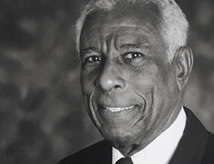Trinidadian Ulric Cross, Chairman of the Caricom Audit Commission which audited the results of the hotly disputed 1997 general elections here has passed away.
Cross led a team of regional luminaries and electoral officials to review the results after the impasse between the PPP/C and PNC over the results which saw Mrs Janet Jagan being sworn in as President. The work of the audit commission was brokered under the historic Herdmanston Accord.
After scrutiny of ballot boxes and speaking to electoral officials and others, the Commission did not find any serious problem with the result. The findings of the Commission failed to end the political stalemate here and required a further meeting and assurances under what became known as the St Lucia Statement. The Trinidad Express story today on Cross follows.
(Trinidad Express) Former judge, diplomat and war hero Philip Louis Ulric Cross has died.
The 96-year-old World War II veteran’s passing yesterday afternoon at the family home on Dere Street, Port of Spain, was “extremely peaceful and pain-free”, his daughter Lady Susan Woodford-Hollick told the Express in a brief interview yesterday.
Lady Hollick said her father had been convalescing after very serious surgery he had undergone ten days ago, and had seemed to be making a recovery. His wife Ann, Lady Hollick and his other daughter, Nicola, were at his side when he died.
“The man’s track record speaks for itself,” National Security Minister Gary Griffith said, surprised when he received the news from the Express. “I would have thought he could have gone on to be 100…he was evergreen. This is a loss to us and he will be missed,” Griffith said.
Aside from his distinguished professional services to his country, Cross was also the first chairman of the Express Children’s Fund, an active member of the Heroes Foundation, and the first chairman of its advisory board.
The foundation’s founder Phillip Julien told the Express yesterday that he was “blessed” to be able to call Cross his friend.
“He was the first person recommended to me when I decided to start the foundation. He agreed, and because of the strength of his character and the respect he commanded, this made him a powerful catalyst for moving the foundation forward and attracting other interested, influential members of society,” Julien said.
Philip Louis Ulric Cross was born on May 1, 1917 in Port of Spain, the second child of nine, to Reginald and Maud Cross.
When he was 11 years old, he topped the primary school Exhibition Examination, and was awarded a government scholarship to attend St Mary’s College. His mother’s death when he was 13 affected him deeply, and after five years of secondary school he left. His first job was as a copy editor with the Trinidad Guardian.
At the height of World War II, in 1941, when he was 24 years old, Cross signed up for the Royal Air Force (RAF), attaining the rank of Squadron Leader. He was the only West Indian in his squadron.
In June 1944 he was awarded the Distinguished Flying Cross and in January 1945 he received the Distinguished Service Order, both in recognition of his “fine example of keenness and devotion to duty” and “exceptional navigational ability”.
His experience in the war was the inspiration for the character of the black Squadron Leader, Charles Ford, in British novelist Ken Follet’s book Hornet Flight.
After the war, he was released from the RAF and trained as a lawyer. On completion in 1949, he spent 16 years in Africa, first in the Gold Coast (independent as Ghana in 1957) and then as Attorney General in Cameroon. He became a High Court judge in Tanzania before returning to Trinidad in 1974, where he was also made a High Court Judge. In 1979 he was elevated to the Court of Appeal and from 1990-93 served as High Commissioner for Trinidad and Tobago to the United Kingdom, combining the position with that of Ambassador to both Germany and France.
In 2011, he was awarded the nation’s highest honour, the Order of the Republic of Trinidad and Tobago for distinguished and outstanding service in the sphere of Law.

